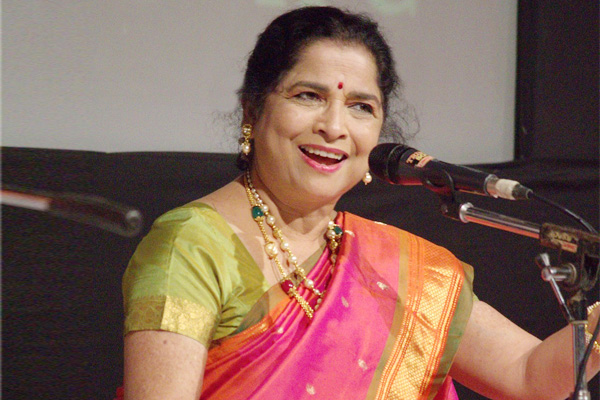For more on radio and music business news. | Click on RNMBiz

MUMBAI: Hailing from a family, whose roots of music belong to the pre-independent era, Varsha Bhave is a renowned name in the theatre music space. Through her expertise, Varsha wants to promote the theatre music legacy of Maharashtra, which needs attention. She also owns Kalangan institute that imparts musical training to kids from the age of three.
The artist recently performed at NCPA’s Natyavividha: An Evening of Marathi Theatre Music, with fellow singers, Avanti Patel, Ketaki Bhave-Joshi, Shrirang Bhave and Dhananjay Mhaskar. The show and its music was created by Bhave herself.
In an exclusive interview with Radioandmusic, Varsha Bhave talks about Natyavividha, theatre music and drama and her hobby of teaching music to kids that led to her developing the Kalangan institute.
Tell us about Natyavividha: An Evening of Marathi Theatre Music? How did this idea click?
This concept came into my head because our Marathi theatre music has a lot of variety that needs to be showcased to the audience. It comprises of classical singing genres like bandish, lavani, thumri and abhangs. There are a variety of songs, sung for different situations in a drama. For example, dramas like Katiyar and Mandarmaala has bandish, Swarasamaratani has lavani, some dramas have bhavageet, lokgeet etc. Thus, we have involved various songs in our theatre drama, hence I thought of presenting them through an event.
Which forms of music are used in theatre drama?
Theatre music has two important companions, an organ, and tabla will be taken care of by Mandar Kundale. Its history dates back to 1843, with Sita Swayamvar being the first Marathi drama, presented by Vishnudas Bhave. After this, many musical dramas were performed that initially focussed on folklore. But, later, social issues also, started getting a place in the drama space.
Earlier, musical drama was a performance, whose story was told through music. But, in the later ages, music became an inseparable part of theatre drama and famous dramas like Katiyar Kaljatli are its best example. Others like Mandarmala also have music as a concept, but Saubhadra, Swayamvar didn’t have music as a subject, else had fervour of creating a mehfil. Initially, the duration of these dramas was long and lasted for the whole night. But, today, both, time and amount of dramas has lessened. But, theatre music is a legacy of Maharashtra, which is still alive.
The tradition of Marathi theatre music needs attention. How do you think, you and other artists can contribute to preserving this legacy?
Yes, we need to preserve this legacy by presenting small or big dramas based on theatre music. This will keep this form of art, alive amid people as well as today’s generation will know about it.
What are your upcoming programs?
I am happy to tell that on 15 August, people will have a good opportunity to know what theatre music is, through our show, Cheeranjeev Sau Ka Rangbhoomi. The entire history of drama will be presented in it. While the first half will have details about music drama, the latter part will compromise of different types of dramas. You can say that the stage will be the narrator at the event, which will be presented by Natyasampada Manch. The event will be held at Dinanath Mangeshkar hall. Apart from this, other drama events are also in the pipeline.
What led you to choose this profession?
My grandmother, Indirabai Khadilkar was a renowned singer of old times. Also, my great grandfather Natyacharya Khrushnaji Prabhakar Khadilkar has worked with Tirtha and written a lot of dramas like Bal Gandharva. Also, the environment at my home was always musical, owing to which, I started learning singing from a very small age. But, when I was an adult, I realized that I like to teach children. Hence, I started my institute called Kalangan. Now, I teach theatre music as well as present events.
What is Kalangan institute's course curriculum?
My institute Kalangan is situated in Dadar at Shivaji Park. Kids from the age group of three attend my Kalangan institute, which is not the scene at other organizations. But, according to me, this age of children is like a blotting paper, when they learn with great enthusiasm. Thus, the age group from three to six is a sensitive time from the point of learning.
When it comes to the courses, I have designed different courses for the age group of three, five, seven and nine years respectively. Having the duration of one and a half to two years, the course comprises of everything that kids love, except Bollywood.
It has Balgeet, songs on animals, doll songs, melodious songs and dhamaal. We also have drawing and Marathi writing. Our aim is to focus on Marathi because kids, today, study in English medium, but making them acquainted with their mother tongue is a must. After completion of these four years, kids then learn classical singing, for which, I have government approved courses. My students teach at my institute. I have many students, who have learned from me for about 15 years.
Tell us about the music direction done by you?
I have done music direction in experimental dramas for various competitions. I have also won prizes, for the same, in various Marathi competitions. But for Sau Ka Rang Bhoomi, I will be giving professional theatre music for it.